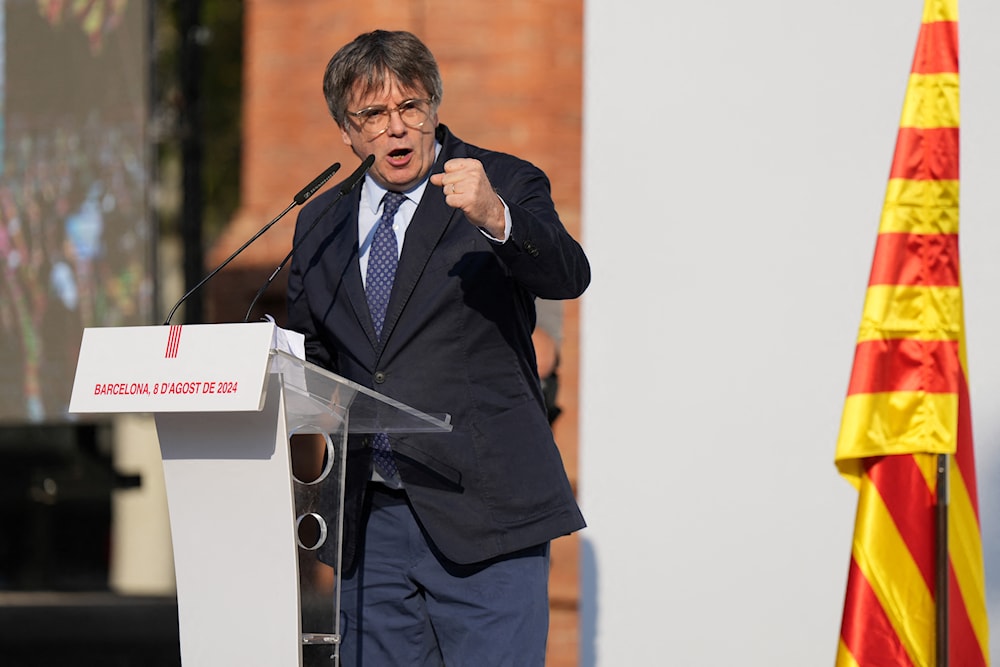Catalonia's exiled Puigdemont appears in Spain, vanishes shortly after
Following his address, Puigdemont appeared to head toward the nearby Catalan parliament but left his whereabouts unknown.
-

Catalonia's exiled separatist leader Carles Puigdemont delivers a speech on stage as his hardline separatist JxCAT party has scheduled a welcome ceremony, ahead of an investiture vote at the Parliament of Catalonia, in Barcelona on August 8, 2024. (AFP)
Carles Puigdemont, the former Catalan leader who fled Spain following his involvement in the failed 2017 independence attempt for the region, made a dramatic return to Spain on Thursday after seven years in exile despite facing an outstanding arrest warrant.
However, he swiftly vanished from public view once more.
As he ascended a stage in Barcelona to address a large crowd gathered near the Catalan regional parliament, Puigdemont shouted, "Long live a free Catalonia!"
"I have come here to remind you that we are still here," Puigdemont said as many in the crowd waved red, yellow, and blue Catalan independence flags.
Following his address, Puigdemont appeared to head toward the nearby Catalan parliament. However, the assembly began the investiture vote to elect a new regional leader without his presence, leaving his whereabouts unknown.
Spanish media reported that police had set up roadblocks in Barcelona and were searching vehicles in an attempt to locate him.
Catalonia's regional police force confirmed it had arrested one of its officers on suspicion of helping Puigdemont flee after his brief speech.
The media mentioned that the officer reportedly owns a car in which Puigdemont escaped after addressing a few thousand supporters near the Catalan parliament.
Nearby, a small group of protesters waved Spanish national flags and held signs reading "Catalonia is Spain," in a demonstration staged by the far-right party Vox.
Puigdemont’s unexpected return coincided with a recent agreement between Spanish Prime Minister Pedro Sanchez's Socialists and the moderate Catalan separatist party ERC. The deal is intended to secure the election of Socialist candidate Salvador Illa as the next head of the Catalan regional government.
Despite the Socialists winning the most seats in a regional election in May, they fell short of a majority, making ERC’s support crucial. If a new Catalan government is not formed by August 26, fresh elections will be called in October.
Puigdemont led Catalonia in 2017, pushing forward with an independence referendum despite a court ban and later declaring independence briefly. He fled Spain to avoid prosecution and has since resided in Belgium and, more recently, France.
While Spain’s parliament passed an amnesty law in May for those involved in the failed secession attempt, the Supreme Court ruled on July 1 that it would not fully apply to Puigdemont.
"A country that has an amnesty law and does not apply it, has a problem with democracy," he stressed during his Thursday speech.
Sanchez’s agreement to the amnesty law was pivotal in securing Puigdemont's JxCAT’s support for his fragile minority government, which sparked large right-wing protests.
He now faces opposition within his own Socialist party and from the right over a proposal to grant Catalonia full control over the taxes collected in the region—a long-standing demand of Catalan independence parties, though critics warn it could deprive the central government of significant revenue.
This proposal, still requiring approval from Spain’s national parliament, mirrors a similar arrangement in Spain's Basque Country, which also has an active independence movement.
Should Illa win Thursday’s investiture vote, he would become the first Catalan regional leader from outside the separatist camp since 2010.

 3 Min Read
3 Min Read








